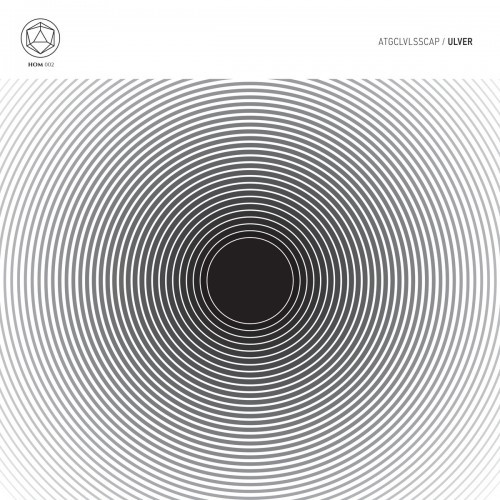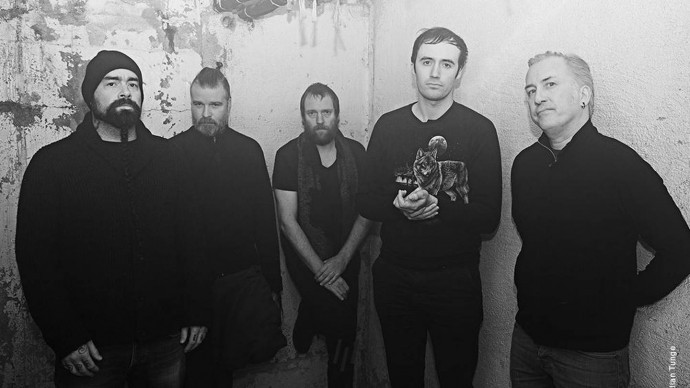(Andy Synn reviews the new album by Norway’s Ulver.)
Every Ulver album is unique. But the manner in which the band set about creating their latest opus is certainly more unique than usual.
The music and sounds found on ATGCLVLSSCAP are, in essence, the results of a series of lengthy live improvisations and extemporisations that saw the band taking hold of whatever idea or inspiration would come to them, whether new or old (some of these tracks building from seeds sown in earlier material), and spinning it off into strange and uncharted territory, creating and conjuring new songs and new sounds almost on the fly.
And yet, that isn’t the whole story, as the fruits of these recordings were then taken back to be analysed, deconstructed, re-tracked and (in some cases) further reimagined in the confines of the band’s home-studio, with the final results managing to capture and maintain the sense of spontaneity and invention from those early live sessions whilst bolstering them with 1.21 gigawatts of pure sonic super-science!
So this album is perhaps even harder to categorise than usual. It’s not a “remix album”, and yet it does contain and expand upon elements drawn from their previous works. It’s not a “live album”, and yet it has its roots in the live arena, brimming with all the energy and vitality that only the live experience can provide. And it’s not a wholly “improv album” either, though the sense of spontaneous creativity and insight spread across its twelve tracks remains undimmed by time spent being further shaped and refined in the studio.
Perhaps it really is just enough to say that this an Ulver album, and go on from there.
Though the obvious melodic hooks (particularly vocally) of albums such as Shadows of the Sun and Wars of the Roses are largely absent, ATGCLVLSSCAP continues and expands upon the unusual, digital chamber-music approach found on Messe I.X-VI.X, whilst also clearly referencing the electro-existentialist soundscapes of Perdition City in the process, unveiling twelve distinct, yet interconnected, compositions, each one another chapter in an ever-evolving story, where everything old is made new again.
In truth any attempt to describe all 80+ minutes of ATGCLVLSSCAP in full would probably take up more time and more kilobytes than strictly necessary, and be doomed to failure besides. After all, the joy in any Ulver album is in exploring and discovering its surprises and delights for yourself, plumbing the depths of its ever-changing layers with each and every listen. But it doesn’t feel quite right to just leave things there without touching upon some of the strange and compelling sights and sounds you’re likely to experience on this particular trip into outer/inner space.
The album as a whole unfolds in suitably cinematic fashion, a soundtrack for journeys both physical and metaphysical, beginning with the chiming bells and enveloping cosmic ambience of “England’s Hidden” and the haunting retro-futurism of “Glammer Hammer” (which turns surprisingly heavy and oppressive in its second half), while the vibrant percussive backbone which propels the synthetic soundscapes of “Moody Stix” positively pulses with livewire vitality, flowing smoothly into the hypnotic, bass-driven “Cromagnosis”, where the impulsive, improvisational energy behind the album’s creation really shines through.
“The Spirits That Lend Strength Are Invisible”, by contrast, strips things down to an eerie, echoing minimalism that flows smoothly into the moody, meditative “Om Hanumate Namah”, where the unscripted, experimental nature of the music once again comes to the fore, with every instrument playing off one another in a mesmerising musical mandala.
The digitised desolation of “Desert/Dawn” carries you away from the warm and natural sounds of its predecessor on a holy pilgrimage into a landscape of stark, pixelated lines and pulsing sine-waves that leads to the bleak, perditious city streets of the noirish “D-Day Drone”, whose palling gloom is finally dispelled by the glimmer of ethereal synths which permeates “Gold Beach”.
The shining, shimmering guitar lines and lithe, limber drums of “Nowhere (Sweet Sixteen)” signals the album entering its final phase, with Rygg’s always compelling vocals finally taking a prominent position within the warp and weft of the music, building towards the solemn, penultimate crescendo of “Ecclesiastes (A Vernal Catnap)”, whose mournful piano motif and unearthly ambience provide a perfect backing for a series of sombre reflections on the nature of life and death, before the entire epic voyage (anti)climaxes with the rhythmic, digital psalm of “Solaris”.
Ulver have always (well, almost always) construed their music as a companion piece to the invisible films which exist only within their collective unconscious, and in that sense ATGCLVLSSCAP is no different, regardless of its unusual genesis.
Once again we find the band painting pictures without physical form, shaping images with sound, always in motion, telling a story that changes with each flickering electron pulse or fluctuating vibration of the strings.
Yet in some ways the music on ATGCLVLSSCAP also offers us a blank canvas on which to project (or reflect upon) ourselves. The band provide the music. They build the stage and set the scene. It’s we who provide the actors and eidolons to populate this strange new world they’ve created.
And, in that sense, this is as much a collaboration between the band and their audience as it is an intermingling of improvisation and conscious design. You get out of the experience only the fruits of what you are willing to put into it. May you be blessed with a rich harvest.
https://ulver.bandcamp.com/album/atgclvlsscap
https://www.facebook.com/Ulver-31166220421/



“Every Ulver album is unique. But the manner in which the band set about creating their latest opus is certainly more unique than usual.”
As opening statements go, this is a remarkable opening statement.
But is it unique? That’s the real question.
Yes. Yes, it is.
https://duckduckgo.com/?q=%22more+unique+than+usual%22
It doesn’t seem to be an uncontroversial subject, which is why I didn’t take it up with Mr. Synn before posting, though I also tend to side with this point of view:
“It seems to me that the trend toward talking about degrees of uniqueness is an example of how language changes. I had to ask myself if I am on the side of sticking with the older rule or going with common usage, and in this case I think unique should continue to mean one of a kind. There are plenty of other words that people can use to talk about degrees. A piece of art can be the most stunning painting you’ve ever seen, or the marimbas can be very unusual. There’s just no reason to assign a new meaning to unique. So it’s good to know that this is a controversial area of language, but I can’t recommend modifying absolute words with qualifiers in phrases like very unique, completely destroyed, or most fatal.”
http://www.quickanddirtytips.com/education/grammar/modifying-absolutes
Blame it on the live, improvisational nature of my writing. I won’t be constrained by your rules!
I prefer to think that you align yourself with the drafters of the Preamble to the U.S. Constitution: “We the People of the United States, in Order to form a more perfect Union….”
…and you’re doing SO well.
All I know is,that cover wants to give me a migraine.
Been waiting for this, and the album.
“Ulver have always (well, almost always) construed their music as a companion piece to the invisible films which exist only within their collective unconscious…” — couldn’t have described it any better.
Beautiful soundscapes, I need this one
Oops